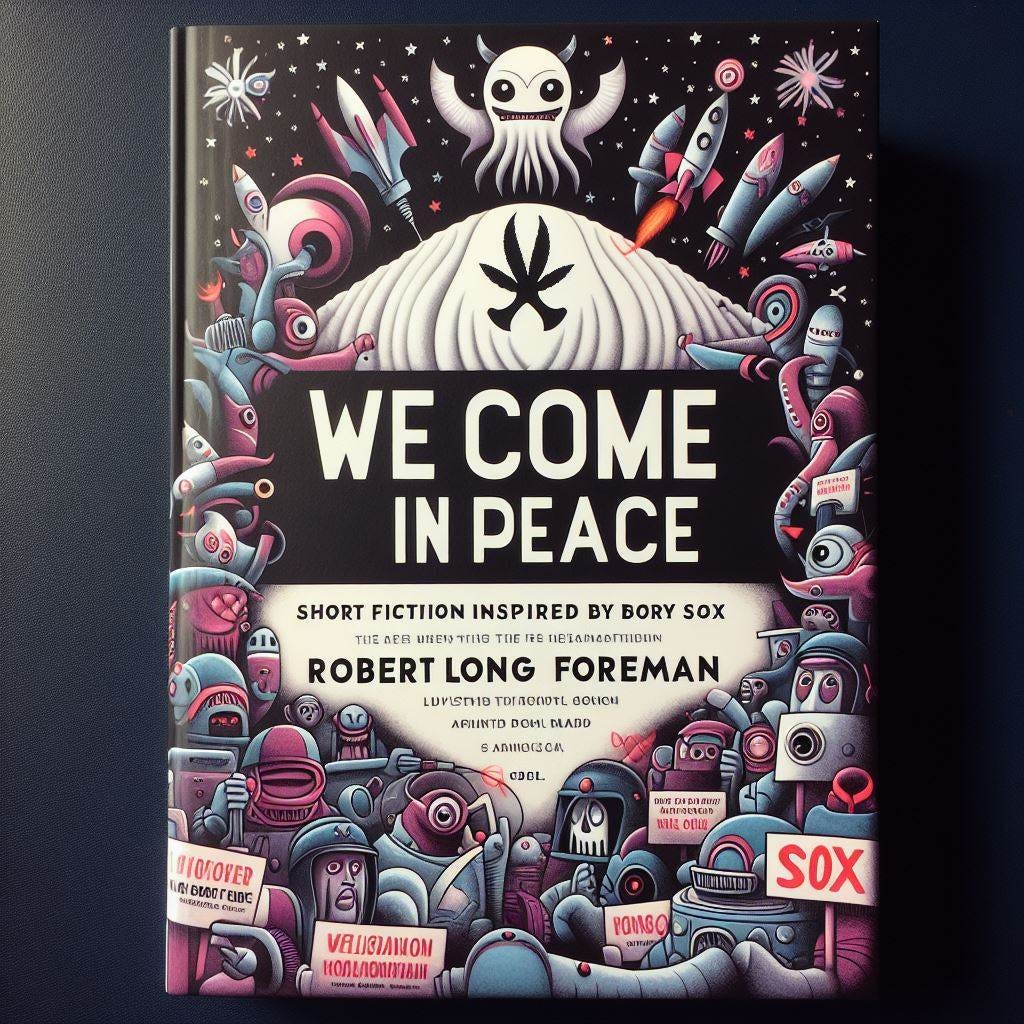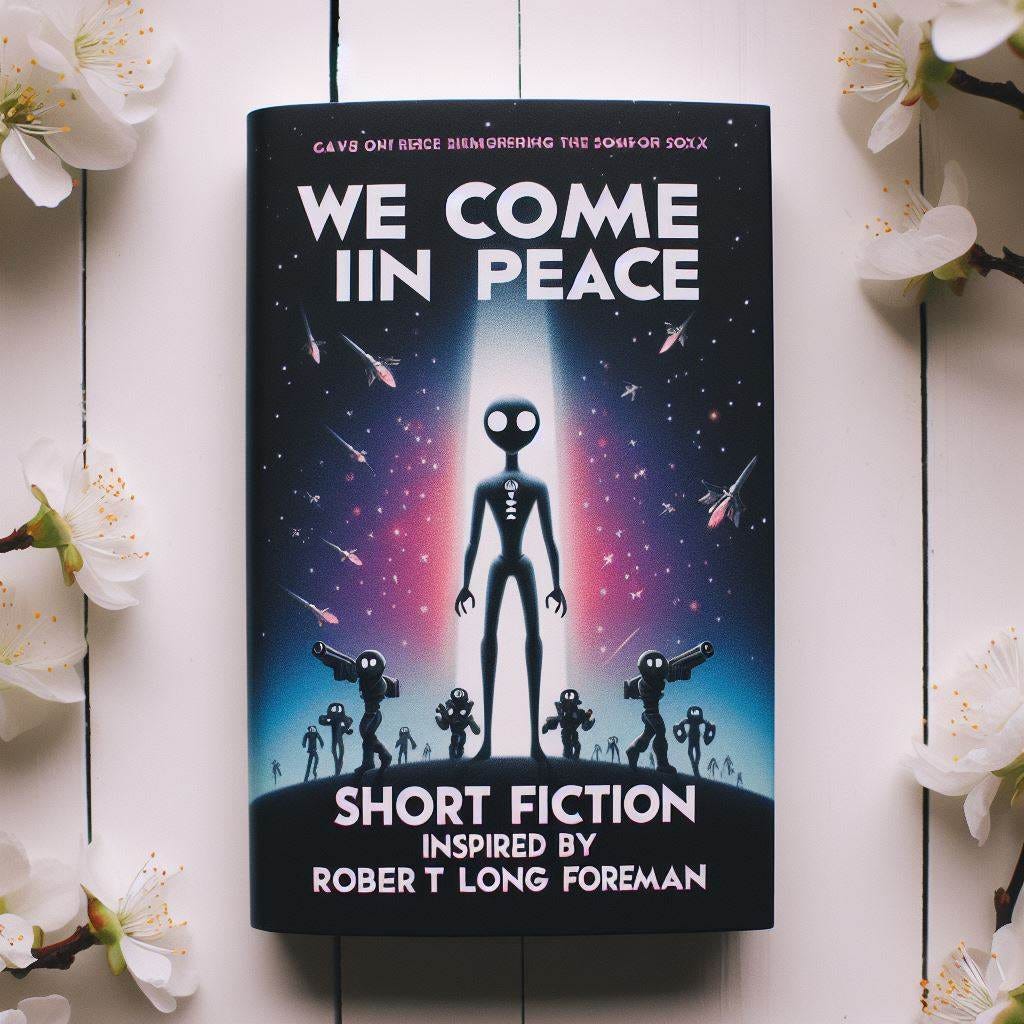Final Thought, First
I know Pete Seeger is an unlikely guy to be listening to in 2024. But there’s an album of his that was rereleased some years ago, a recording of a performance he gave at Bowdoin College in 1960. He performs a song that Leadbelly wrote, which he and his group The Weavers turned into an apparently less good song. I guess that’s arguable.
But Pete Seeger had his moments, and one was when, after the first verse of singing this song live, at Bowdoin College, he encourages the audience to sing along by saying, “If you believe it, sing it.”
No computer will ever tell a person “If you believe it, sing it.” If it does, it won’t mean it, not like a person can mean it. It won’t be like when Pete Seeger said it onstage, and on a morning sixty-four years later another man felt those words in his heart, and he sat in his basement breathing, petting his cat, and looking forward to when his children would come home from school and he could hug them and ask how their days at school went.
I know that tragedies happen. I know about atrocities. I know that sometimes the kids don’t come home from school. It’s a miracle, every time they do.
This newsletter will largely be about artificial intelligence and the things it can make. I have some conclusions to work my way toward, but for now, right here, I want to say that while it’s not always so great to be alive, sometimes it is. Maybe I’m in an exceptional mood, because I just woke up from a nap, and kissed the wife I’m so lucky to spend so much of my one life with. But I came back down here to the basement, to finish my newsletter, and I know that while it hurts to be alive, a lot of the time, it is also beautiful. It is a great gift, to get to be a human being.
I’ve never asked much of the people who read this. And I’m not asking for much when I say I want everyone who reads or hears this to spend some time today or tomorrow doing something that it takes a heart and a mind to do, something that requires humanity. Write someone a message that only they will truly understand. Take a photograph of something that has meaning to you or someone close to you. Join a protest for a cause you know is right. Tell someone you love them. Sing a song you know by heart. In your own way, make the world a little more beautiful. It’s something we all know how to do.
And I’m not going to edit this part out later, when my mood changes. I’m keeping this part in, damn it. I don’t care what my future self has to say about doing things that are beautiful.
The Hidden Room Dream
I went out with some friends recently, in Lawrence, Kansas—not to brag or anything—and I talked with them about something I’d read recently. I don’t recall what it was exactly—an essay from online? a page from a book?—but the author, who I think was a woman, not that it matters, described a recurring dream she has had in which she discovers, in her home, a door she didn’t know was there, or knew was there and never bothered opening. She opens the door, in the dream, and finds it leads to a room full of undiscovered treasures. All this time, that wonderful room has been right there, and now she’s on the other side, and it feels so good to have crossed into it.
She explained, in the essay, whoever it was, that this is a common dream lots of people have all the time. It’s the Hidden Room Dream—yes, it even has a name—and apparently I am the last to find out how common it is.
What a buzzkill! Right? I thought I was the only one who had that dream.
Actually, that’s not true. Last year, someone on a podcast described my recurring Hidden Room Dream almost perfectly, saying it’s a dream he has often. He goes into the hidden room and thinks, What’s this room doing here? It has all of this behind it? How have I neglected a place with such potential all this time? I thought it was a wild coincidence, that he and I had the same dream, but no, I guess our shared dream is just one of the nighttime slideshows that come with every human brain.
But despite how common the dream might be, we are all free to interpret it as we please.
Maybe the dream is your mind alerting you to untapped potential, or it’s a premonition of new ideas, new possibilities, maybe a cool watch that you’ll find lying on the ground outside a Citgo station that will lead you to a mystery that only you can solve.
Maybe it means that. But I’d like to think that this dream is something like a preview of what it feels like to die.
What if, when we die, it’s something like the Hidden Room Dream? What if it feels something like opening a door that’s been there all along, that we’ve always known was there but ignored in the name of carrying on? What if the feeling of dying, of being the one who dies, is the feeling that saturates that dream? Oh, so that’s what’s been behind that door all this time! How could I have never walked through this door before? Maybe that’s how it feels to be born.
Song Generator
I’ve spent some time in recent days using an artificially intelligent song generator. I heard Vic Berger and Doug Lussenhop talk about song generators, and heard some songs they made using one, on the podcast Office Hours. I thought I’d try it out myself, and see what the fuss was about.
As it happens, a while back, maybe a year and a half ago, I wondered what it would be like if I had a podcast. Would the podcast be terrible? Yes, it would. I knew it would be terrible. But still I thought, would it be also maybe a little good? No, it wouldn’t. Not at all. I knew that.
But that didn’t stop me from considering making one anyway. I thought if I did make one it would need a theme song. But where would that come from? Would I record one? I don’t know how to sing or play any instruments. I remember speculating, in an email to a musician, about how in the near future there would no doubt be a computer program that would generate a song out of thin air based on your specifications, without anyone having to pick up a guitar or go near a microphone. It could make your song sound like Bing Crosby was singing it, or Bob Dylan.
I don’t know if any song generators can do that yet, exactly, but I’ve been playing with one that can do everything else. You enter your own lyrics into it, and tell it what style of music you want, or what era of recorded tunes you want it to mimic, and in seconds it will vomit a result.
I knew what I would ultimately conclude about this technology, the short version of which is that it sucks and is an insult to actual songwriters, the art of making music, and the human spirit. In the fourth section of this newsletter I will walk you through my thinking, there, but first I want to share the part I had fun with.
I thought I would see what happened if I tried using the song generator to make a theme song for my podcast, which at the moment is just an audio version of this newsletter, but which could turn into something else if I thought of something else to do with it.
In order to have a theme song for this podcast, I had to write lyrics for it. I didn’t want to put more than a few moments’ thought into the lyrics, and so I didn’t.
These are the lyrics I wrote:
Sometimes what you need is a massage
Sometimes what you need is a job
What you need right now is something new
It's clean and it's good and it's made by a man
It's The Pig City News Weekly Register Hoedown Quarterly Review Times a Thousand.
Talking is good. Thinking is better.
Talking without thinking is also good sometimes.
It's The Pig City News Weekly Register Hoedown Quarterly Review Times a Thousand.
One of the fun side effects of doing all of this is that I have finally learned the name of my own newsletter. I always used to forget what order the words went in, since their order is arbitrary. Now that I’ve heard the words sung in the proper order dozens of times, I don’t have that problem. It’s the Pig City News Weekly Register Hoedown Quarterly Review Times a Thousand.
I asked the song generator to make the song I wrote lyrics for sound like an English folk-rock song from the 1960s. That is what it did, sort of. I wanted something that sounded like Fairport Convention, but it didn’t achieve that, really. Judge for yourself.
But first, be warned. Before I play these songs, or post links to them, I want to share my experience, which was that I listened to these things multiple times, and found that they became the songs that played in my head at all times when I was doing other stuff. Instead of “Void” by Melanie Martinez in back of my mind, I heard this pretend song that no person ever touched. AI-generated songs can be earworms, I guess, and it’s kind of galling. I take it personally.
Anyway:
That is, I think, the best version of my podcast’s theme song. I was editing it, at one point, and when I listened close at the 1:29 mark I heard the distinct sound of the vocalists inhaling. I found that to be rather strange, as nothing you hear on that recording can actually breathe. It’s all just circuits and electricity.
I also enjoy, though, this slower, perhaps more self-indulgent version of the the theme song, which sounds maybe like Harry Chapin recorded it, or rather a young Neil Diamond. It even has a guitar solo, for some reason:
What the hell? I’ll include a third version, too, which has its merits:
Here is a 1980s heavy metal version, in which I accidentally typed the word “the” twice, so the singer says “the” twice every time he says “the”:
Now, finally, here is the 1990s hip hop version, in which I asked for two female vocalists because I wanted it to sound like Salt N Pepa:
Is it weirder to generate songs when the musicians who are being emulated are people of color? Yes, it definitely is.
Is that as it should be? I have no idea. But it definitely seems more wrong to me.
But then this whole thing feels wrong to me, because I know that the machine is only able to make this stuff because it’s mimicking actual recordings of real people. These fake songs could not exist if real songs hadn’t been recorded by human beings. So this is kind of like watching a show put on by a troupe of reanimated corpses. I’m not saying it can’t be fun, that it can’t make you laugh. But it is messed up. Right?
The last thing I want to play is not a theme song for a podcast but something that resulted from me plugging text into the song generator that I compiled a couple of years ago. I’ll play it first, or post the link, and then I’ll explain where the words in it came from, because it seems like the funniest order of things. See if you can guess where the words that appear in the lyrics arose:
I’ll give you the answer. The lyrics come from titles of books by Joyce Carol Oates.
A while back, I thought it would be funny to take the titles of Joyce Carol Oates’s many books and arrange them to form sentences, which, if you do this rearranging, accrue to become a nonsensical piece of short fiction. She has written so many books that you can do that.
Since I compiled all of those words, I’ve turned the nonsense short fiction that resulted and kind of folded it into an essay in which I express, among other things, regret over the fact that I thought to do that thing with JCO’s book titles at all. It seems disrespectful at best. It’s a good essay, though, and I’m hoping someone publishes it, because it took me a long time to write the damned thing.
But when I heard the song that the song generator made those words into, I felt like I’d heard all I needed to hear from this invention. When I listen to that song, I am convinced that I can hear all of the little things the song generator is doing to manipulate me.
What do I mean? I don’t know! I don’t know how to explain it. I don’t know how to talk about songs. Despite the number of life-minutes I’ve spent listening to music, I know absolutely nothing about how it works.
But there’s a moment forty-two seconds in, and another one one minute and eight seconds in, where the song generator is making sounds that are meant to evoke certain feelings in me. And I know that that’s what it’s doing. And I know that’s all that it’s doing. It’s not making those sounds because it wants to, because the creative spirit directed it to, the way real artists’ hands seem to be guided by external forces sometimes. That can’t happen, here. All that the machine can do is try to please us, which is the short version of why I think nothing it makes will ever truly be art. I know it’s too early to say anything definitive about AI without sounding like a fool, either now or in the future. I’ll get into that more in a minute.
Before I move on, here is one more “song.” I copied and pasted the first five paragraphs of Machiavelli’s The Prince into the song generator, and asked it to make it sound like a 1950s rock song:
The Verdict
Listen: I get it. Believe me: I know. As I’ve mentioned already, I am aware that anything I say now about artificial intelligence will look, in the future, if not in the present, like someone opining in 1969 about the body of work produced by the English folk-rock band Fairport Convention. At that time, the band had not released their albums Full House or Angel Delight, among many others.
You can’t judge Fairport based strictly on what they achieved in such a limited period of time. They were only getting started, then. There was so much ahead of them, and there is more to them than the heights they reached on What We Did on Our Holidays and their self-titled first album.
Actually, you know what? This is a terrible example. You absolutely can judge Fairport Convention based on what they had done by the year 1969. It was when they did their best work, I think. I should have cited a different band.
But this isn’t even about them. It’s about the AI song generator I’ve been using the last five days or so, when I’ve felt like using it. I just want to establish that I’m aware of how the technology is too new for someone like me, who has nothing to do with its creation or design, or management or whatever, to say anything substantive about it.
And yet, here I go.
I’ve written an essay that no one has wanted to publish yet—a recurring element of this newsletter!—about time I spent playing around with image generators, how I used one to make images of covers for books I’ve written but which haven’t been published, which only exist in manuscript form. The short version is that I found it was fun, at first, to make those things, and kind of reassuring in an odd way to see pretend physical copies of books that may someday be real objects you can hold in your hands.
Like, for example, here is one I just made for a manuscript that will never be a book, for obvious reasons, even though it’s really good and people would like it. It’s called WE COME IN PEACE: SHORT FICTION INSPIRED BY SEX.
It’s fun to have the machine make this trash! But it’s also alienating, and the images that emerged in response to my prompts only got weirder and more disgusting as I went on and on.
The real problem, though, the source of true alienation, was that this image generation seemed like a terrible perversion of the creative process. There is not even a process at work in it. It’s instantaneous. With these AI generator things, the thing you’re working on can’t talk back to you, the way it does when, say, you’re writing a newsletter, essay, short story, or poem. Or when you’re writing a song, I imagine.
I don’t mean this literally. Poems can’t literally talk back to their authors. I’m not yet that far gone.
I mean that when you’re doing real creative work, you have to learn to make the thing you’re making as you make it. To a certain extent, at least, the thing you’re making has to teach you how it is to be written. In order to make it good, you have to know how to listen to your own creation as it’s coming into being. It can take a long time, to learn to do this listening—which of course is really a way of listening to yourself and knowing how to interpret what you hear.
That just doesn’t happen with instant product generation. It’s like eating McDonald’s: it tastes great, and as you suck it into your face you may be convinced you’re having a quality meal with fresh ingredients; but it isn’t long before you feel a little sick, because whatever you ate was probably made out of worms and the parasites that live inside of worms, plus microplastics and corn.
My thoughts on all of this are overshadowed, of course, by those of the great Japanese film director Hayao Miyazaki, who is featured in this excruciating clip from YouTube in which some excitable young animators demonstrate for him the animation that artificial intelligence is capable of. They show him animated bodies of what look like zombies, or something. They say that the bodies made by AI move the way human animators are unlikely to conceive of on their own. And I hope that I never find myself in a room where a conversation like this one is taking place. It might give me a heart attack:
In the translation to English, Miyazaki says, after watching the AI-generated animation, “Whoever creates this stuff has no idea what pain is or whatsoever. I am utterly disgusted…I strongly feel that this is an insult to life itself.”
That is, as it happens, how I feel when I reread the first draft, and in some cases the final draft, of anything I myself have ever written. But that’s a problem I have with myself. Don’t worry about it.
Miyazaki says another thing, later in the same video clip, where he’s presumably reflecting on the advent of AI. He says, “I feel like we are nearing to the end of times. We humans are losing faith in ourselves.”
I think about that second sentence he uttered a lot. Ever since I first watched this video, I have wondered what he meant by it. But I also think it’s not complicated, and it’s probably sort of obvious what he meant by it.
I was thinking of humans losing faith in ourselves in recent days, as I used the online instant song generator. It gave me, over and over again, that junk food feeling, the feeling that comes with making something that takes no effort whatsoever. I was amused by the so-called creations. They made me laugh and laugh.
I came to the conclusion, not long ago, that hysterical laughter is my substitute for crying. I almost never cry—it happens maybe once every few years, and it takes a lot to bring it on. I’m not joking. I wish it were otherwise. If I cried more often, I’d be a happier man.
But some of the songs I prompted the machine to make threw me into hysterics when I heard them. As I laughed, I thought, yeah, this is the way I get tears to come out of my eyes. People really are losing faith in themselves.
I own a guitar. I own a banjo. I have a voice I can use to sing. What do I need with a song generator?
The obvious answer is that despite my having access to instruments I still can’t make music. I barely know how to play the things I have.
But still. Holy shit. What would Pete Seeger say to that?
I could learn to play the instruments, couldn’t I? With the time I spent typing prompts into the song generator, I could have practiced chords like C, B, F, A, and E. I know how to make those on the guitar. Why don’t I do that? I could do it right now. I could write a song, and actually try to do a good job, which is the opposite of what I did when I wrote lyrics for the song generator. When I gave it prompts, I tried to write songs that were bad on purpose, to see how awful they would be. I didn’t try to do a good job. What would be the point in that?
Is it possible that I’ve lost faith in myself, as Miyazaki says we’re doing? Is AI art coming into being because people are so lost they’ll settle for garbage when they could have things that are better than garbage? Could it be that we’re not losing faith in ourselves so much as we’re losing faith in one another? Maybe it’s a question not so much of what we enjoy as it is what we’re willing to make for other people, and how much time we feel should be devoted to the things we present our friends with. Do I really have so little respect for my pals on social media that I’ll post, for their listening pleasure, a theme song I wrote for myself, which the song generator made sound like a 1980s rock anthem?
The answer is yes, I guess.
At this moment, at least, I see myself in both parties who are present for that meeting with Miyazaki in the YouTube video. I am the disapproving elder at the same time that I’m the bright-eyed youngster who can’t wait to see what the director thinks of the thing his computer made for him to look at. The young guy looks equal parts broken and angry, when he hears the great man’s response.
The difference between me and him, I suspect—though I could be wrong about that—is that I think Miyazaki is right to reject the AI-generated imagery.
I knew, going into this song generation, that I would feel bad about it, that my ultimate verdict would be that it’s a dumb distraction from things that are truly worthwhile. But I wanted, as I did with AI image generation, to try it out. I wanted to see for myself what it could do. And I can’t deny that it was fun to make songs, and that I laughed a lot at what the machine made, at the same time that I don’t think I can bring myself to actually do something with the recordings that came out of it. I think this is a dead end.
I also wanted to share with everyone who reads or listens to this what I came up with on my way to smacking my nose against that dead end.
The last thing I’ll say about this is that whenever I hear someone talking about how much potential there is in AI and its capacity to generate creative work, I can’t help thinking to myself that despite all of their enthusiasm, and despite how cool some of the things they make look or sound, the things they’re making aren’t real—as in, they don’t exist outside of computers. You can auto-generate all the AI paintings that you want, but they aren’t actual paintings. There are, in the world, real paintings that people have made by applying paint to surfaces. One of the things that makes art interesting is that it actually exists, and none of this stuff does. I can make all the songs I want on the song generator; you won’t catch anyone performing them in physical spaces. Why would they?
It reminds me of what Tyler, the Creator said online in 2012 about cyberbullying: if it bothers you, why don’t you walk away from the screen? Why not just close your eyes?














Share this post